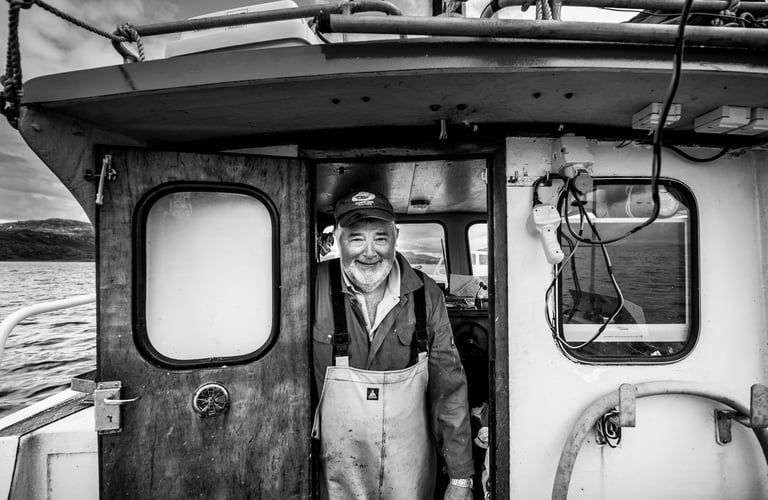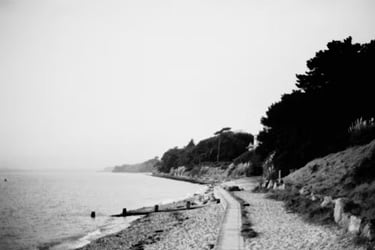
THE DROWNED TRUTH
"In Harrow’s Reach, secrets are as old as the cliffs that guard it, etched into the very stones, whispered by the wind that howls through the abandoned streets. People tell themselves they’ve moved on, that the past is something they can leave behind. But the town is haunted by memories, by the things lost at sea, and the stories that remain untold. As I dug deeper, I began to realize that the truth, like the tide, never stays still. It crashes against the shore, relentless, pulling everything into its depths whether the town is ready or not."
An upcoming dark, coastal mystery where the past never stays buried.
WELCOME TO HARROW'S REACH.
The town crouches against the cliffs. The salt-laden air clings to the weathered buildings, their facades worn smooth by relentless wind and time. The cobbled streets gleam with rain, slick and uneven beneath hurried footsteps. Wooden signs creak on rusted chains, shop windows clouded by time rather than dust. The harbor groans with the weight of old secrets.
The sea is never silent here. It crashes against the jagged cliffs like a restless beast, carving its will into the stone. The tide returns what it chooses. Bodies, wreckage, empty ships.
The people of Harrow’s Reach do not speak of certain things. They know better than to ask why some boats never come back, why others return empty, or why the widows stand at the cliffs, waiting long after their mourning should have ended. The church bells toll for the lost, yet the town continues on, as it always has. Unchanged. Unyielding. Bound to something deeper than the tide.
Those who come to Harrow’s Reach seeking answers rarely find what they’re looking for. But the town is always watching. And the sea never forgets.




“The people of Harrow’s Reach don’t ask too many questions, and they don’t offer too many answers. They carry their history the way the sea carries the dead. Quietly, relentlessly, never letting go. Outsiders think it’s secrecy. But here, we know better. It’s survival.”
THE FISHING INDUSTRY
Harrow’s Reach was built on the sea. Long before the roads were paved or the houses stood firm against the wind, there were boats, small, wooden things, carved by hand and sent out onto the restless waves. Generations of fishermen have made their living here, rising before dawn, hauling in their catch with calloused hands, and returning home with the scent of salt and fish clinging to their skin. It’s an old craft, passed down like an heirloom, and every man who sets foot on a trawler carries the weight of his ancestors behind him.
Fish is the town’s livelihood, its backbone. The docks are never quiet, always humming with the low murmur of men mending nets, the scrape of knives against scales, the rhythmic slap of fish tossed into barrels. The market thrives on the daily catch, haddock, mackerel, sometimes even something rarer, something that makes the buyers lean in close, whispering amongst themselves. The town survives because of the sea, and everyone here knows it.
The children grow up watching, learning. They sit on the worn wooden planks of the docks, dangling their legs over the edge as they watch their fathers, uncles, and grandfathers gut fish with the ease of men who have done it a thousand times before. They chase each other between stacked crates and coiled ropes, playing their games beneath the watchful eyes of the old fishermen. Someday, many of them will take up the trade themselves. Others will leave, but the salt air will never quite wash off.
But for all the ways the sea sustains them, no one swims. No one dares wade into the water, even on the hottest summer days. The shore is lined with jagged rocks, the tides unpredictable, but there’s something else, an unspoken rule, passed from mother to child in hushed tones. The ocean is not meant for playing. It gives, but it also takes.






"You don’t learn the ocean from books. You learn it from the feel of the tide under your boat and the way the wind shifts before a storm."
On a night when the wind howled like a thing possessed and the sea lashed out in fury, the Siren’s Wrath disappeared. No one saw it happen. No one could explain it. One moment, the trawler was navigating the waters off Harrow’s Reach, and the next, it was gone.
A storm had rolled in, but it wasn’t the first time the Siren’s Wrath had faced a tempest. The crew, seasoned men who’d spent their lives braving these unpredictable waters, had known how to handle the fury of the sea. But when the waves subsided, the Siren’s Wrath was nowhere to be found.
The coastguard searched for days, scouring the water for any sign of wreckage, but there was nothing. No pieces of broken wood. No floating debris. No sign that the trawler had ever been there. The sea had claimed it, and no one knew why.
What remained was the ship’s log, recovered weeks later. The last entry was chilling in its simplicity: “We shouldn’t have pulled it up.” Those words, written by Captain Walter Harlow, were the only clue to what had really happened that night. But they raised more questions than answers.
Captain Harlow was a legend in Harrow’s Reach. A man who knew the sea like the back of his hand, who had sailed these waters for decades without ever losing a crew member. Yet, on that night, he disappeared along with the rest of the men. His body was never found. No traces, no evidence of what had happened to him.
The town moved on, as towns do. But the disappearance of the Siren’s Wrath left a shadow that lingered in the back of people’s minds. The local fishermen spoke in hushed tones about the night the trawler vanished. Some said it was just another casualty of the sea. Others muttered about things better left unsaid, things that the town had long since buried. No one talked too much, and no one dared to go near the water at night.
THE VANISHED TRAWLER






Theodore Beck never imagined he'd end up in Harrow's Reach, a small coastal town far from the bustle of city life. As an investigative journalist, he’s always found himself drawn to places on the edge of change: towns struggling to hold on to their histories or grappling with secrets they’d rather keep hidden. So, when the mayor of Harrow’s Reach personally called him to ask for his help, he couldn’t resist.
The mayor, eager to revive the town’s fading charm and attract tourists, sees Theo as the perfect writer to paint Harrow’s Reach in a new light. She wants Theo to write about the town’s quaint coastal appeal, its rich history, and its hardworking fishermen, promoting it as the ideal getaway for those seeking a quiet escape. To the mayor, Theo is the key to a prosperous future, one where Harrow’s Reach isn’t just a forgotten relic but a thriving haven for visitors.
Born and raised in the city, Theo grew up far from the ocean, yet the sea has always held a strange pull over him. His father, a fisherman who spent his life chasing tides and dwindling catches, disappeared when Theo was just a boy, swallowed by the waves, or so the story goes. His mother never spoke of it, never questioned the official report, but Theo always wondered. The ocean took something from him, and though he’s spent his career uncovering hidden truths, this one has always escaped him.
THEODORE BECK


Now, years later, he arrives in Harrow’s Reach under the pretense of writing a feature on a struggling but hopeful town. But the town isn’t just struggling. It’s haunted, not by ghosts, but by something deeper. The recent disappearance of a fishing trawler and its crew should have made national news, yet hardly anyone outside the town has heard about it. The one survivor, found washed ashore, hasn’t spoken a word. The townspeople whisper behind closed doors, eyes flickering to the sea like it might be listening. Something happened out there, and Theo intends to find out what.
But Harrow’s Reach is a place where the past is buried deep, and secrets don’t stay afloat for long. The people here don’t take kindly to outsiders prying into their affairs. The mayor insists the town is thriving, the sheriff warns him not to go stirring up trouble, and the fishermen speak in half-truths and superstitions. Theo has spent his life exposing cover-ups, but for the first time, he feels like he might be the one who’s out of his depth.
The deeper he digs, the more he begins to realize: this town doesn’t just hide its secrets, it protects them. And the sea is always watching.


ELLEN FISHER
She is a quiet observer of life in Harrow’s Reach, but she’s also someone who sees things others miss. Her years spent on the water have given her a unique understanding of the town’s rhythms, and she’s keenly aware of the undercurrents of tension that run beneath its surface. While many people keep their distance from the outsiders who come to the town, Ellen has never been one to shy away from the truth, no matter how unsettling it may be.
Ellen is a woman who does not believe in easy answers, especially not in Harrow’s Reach, where every truth feels like a riddle. While the townspeople accept their lives as they are, Ellen’s refusal to move on from Jonah’s disappearance is more than just denial. It’s a quiet rebellion against a town that prefers to bury its secrets. She understands the cost of knowing too much, but that doesn’t stop her from seeking the truth, even if it means standing alone.
Ellen Fisher is a woman shaped by loss, but not defined by it. Raised in Harrow’s Reach, she grew up surrounded by the harsh realities of the sea. The town’s fishermen are seasoned and proud, and Ellen’s father, a longtime fisherman, taught her the rhythms of the water, the patience required to live in a place where the tides control everything. From an early age, she learned the value of hard work, resilience, and silence. The people of Harrow’s Reach keep their emotions close to their chest, and Ellen is no different. She has always been a woman of few words, more comfortable letting her actions speak than her mouth.
Her marriage to Jonah was a quiet love, the kind that didn’t need to be vocalized, because it was understood. They worked side by side, their lives entwined in the routine of the town, the early mornings spent at the docks, the nights spent under the dim glow of lanterns, and the quiet companionship they shared. When Jonah disappeared with the trawler, Ellen’s world was shaken, but it was more than the loss of her husband. It was the loss of the life she had built, the life that seemed so steady, so certain.
But Ellen is not a woman to fall apart. Instead, she turned inward, burying her grief beneath the surface of the everyday. She returned to the docks, continuing her work, keeping herself busy. The townspeople see her as cold, distant even, but that’s the way she’s always been. There are no grand displays of emotion for Ellen. She keeps her feelings guarded, like a fisherman who knows how to hide the pain of a poor catch.


GRAHAM BENNETT
Graham Bennett never set out to be a part of Harrow’s Reach’s darkest secrets. A mechanic by trade, he’s spent his life fixing engines and keeping the town’s fishing fleet in working order, his hands stained with oil and salt. To the people who know him, Graham is just the quiet man who keeps the machines running, a dependable, if slightly withdrawn, presence in the town. But beneath the surface, he carries a weight that he can’t shake, one that has been passed down to him by his father, Nathaniel Bennett, whose confessions before his death unraveled a history of violence and betrayal.
Graham’s upbringing was colored by his father’s involvement in the town’s long-hidden dealings. As a child, he didn’t fully understand the danger of what his father had been a part of. But now, years later, the truth is a burden he can no longer ignore. He had always tried to stay away from the darker side of Harrow’s Reach—the parts of the town that live in whispered words and shadows—but after his father’s deathbed confession, Graham knows that the past is never as far behind as it seems.
The grief of losing his father is compounded by the guilt Graham feels over the things he never asked, the truths he never uncovered while Nathaniel was alive. Now, Graham is left to pick up the pieces of a fractured legacy, one that haunts him as much as the history of Harrow’s Reach itself. He knows that the town’s struggles are rooted in secrets buried deep, and the weight of his father’s role in those secrets has become too much to bear.
At his core, Graham is a man who values honesty and simplicity. He never wanted to be tangled in the lies that sustain Harrow’s Reach. But as Theo Beck begins asking questions, Graham finds himself drawn back into the web of secrets that bind the town together. He’s torn between his loyalty to his father’s memory and the undeniable truth that has been eating away at him for years.

